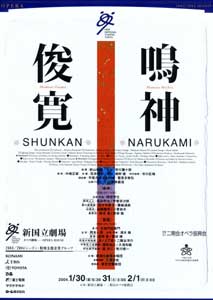|
 The
Encounter of Traditional Japanese Art with its Western Counterpart
Imbues Opera with New Life The
Encounter of Traditional Japanese Art with its Western Counterpart
Imbues Opera with New Life
This program is a double-bill with two operas dealing with
subjects from Japanese classics. Ichikawa Danjuro XII, the
kabuki actor who has been a supporter of Heisei period kabuki,
will take on the challenge of directing opera for the first
time. In particular, Narukami is one of the kabuki juhachiban
(eighteen kabuki plays) in the repertoire of the Ichikawa
acting-family dynasty. High expectations surround the question
of how direction under the head of the Ichikawa family will
change the temporal and spatial dimensions of opera.
Narukami was first performed as an opera in bunraku format
and presented in a visual manner, and the delicate, fine
performance by Yoshida Tamao and other bunraku puppeteers
won the grand prize in the international competition for
the Salzburg TV Opera Prize in 1974. Even a high priest
can be tempted by a woman’s charms and become depraved,
leading to his own ruin. The plot of the opera depicts this
sort of human weaknesses, which is a universal theme. The
opera features a unique structure in which the love affair
in the first part of the play forms a marked contrast with
the harsh business of the second part, thereby creating
striking scenes. The subject of Shunkan is taken from historical
facts that appeared in Heike Monogatari (The Tale of the
Heike). The story of solitude and separation, which has
been handed down from generation to generation in the various
forms of noh, bunraku and kabuki plays, has the power to
deeply move an audience. The libretto uses the noh version
as its text. Shunkan made its debut as a radio broadcast
in 1964 and was first performed on stage in 1965.
Danjuro’s direction will incorporate into the opera
techniques developed by traditional Japanese entertainment.
Particular attention should be paid to the singers who will
have the challenge of breaking new operatic ground. The
opera will also feature the technique of applying the flat
beauty particular to Japanese performing arts to the staging
of an opera. The direction, which is backed by a deep understanding
of the work, will bring out remarkable effects in terms
of both acting and the art of staging.
Synopsis
[Narukami] A long, long time ago,
there was a high priest named Narukami Shonin who lived
high up in the mountains. One day, dissatisfied with the
court, the priest confines all dragon gods throughout the
world to the bottom of a waterfall, thereby causing people
to suffer from a drought. Perplexed by his deed, the emperor
sends the Princess Kumonotaema, a beautiful lady in waiting,
to the priest. The princess uses her beauty to seduce the
priest and serves him wine with the aim of putting him to
sleep. When she cuts the sacred straw festoon, hung at the
bottom of the waterfall, to release all the dragon gods,
it immediately begins to rain heavily and irrigates the
entire country. Awakened, the priest turns into a god of
thunder and rages. Then he jumps from cloud to cloud, chasing
the princess, but it is too late.
[Shunkan] The setting is the
coast on the island of Kikaigashima off southern Kyushu
at the time when the Heike family was at the height of its
prosperity. Caught in a conspiracy aiming to vanquish the
Heike clan, the Buddhist priest Shunkan is banished to the
island together with Tamba Lesser Captain Naritsune and
Taira Police Lieutenant Yasuyori. Shunkan and his fellow
exiles look back upon their former gay lives in the capital
of Kyoto and think about their wives. Then a boat with a
messenger carrying a letter of pardon arrives. The messenger
tells them that a general amnesty has been granted to Naritsune
and Yasuyori but that he was ordered to keep Shunkan on
the island. He also informs the priest that his wife Azumaya
was beheaded because she gave offense to the will of Taira
no Kiyomori. The boat sails away leaving Shunkan bemoaning
his fate, having lost his will to live.
|
